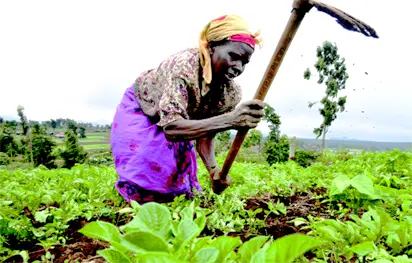An agronomy expert has expressed concern over the rapidly ageing farming population and insufficient government support for the food security agenda.
In an exclusive interview with LEADERSHIP Friday, Professor Uche Amalu from the University of Calabar expressed deep concern over Nigeria’s current food security policies and the ageing demographic of its farming population.
Data from the International Fund for Agricultural Development (IFAD) indicates that the average age of Nigerian household heads engaged in farming is approximately 53 years.
The data suggests that while many young people between the ages of 33 and 34 participate in agriculture, they often do so part-time.
According to the 2024 Wet Season Agricultural Performance Survey (APS), youth participation in agriculture has notably increased. 69% of farmers are male, and the average age is 47.
The report emphasises that Nigeria’s youth are progressively engaging in agricultural activities, although mechanisation remains challenging, with only 22% of farms using tractors.
However, Professor Amalu noted that while Nigeria’s population is predominantly agrarian, a significant portion of its farmers are elderly, which contrasts with global benchmarks, where youth engagement in agriculture drives innovation and productivity.
“Surprisingly, less than 50% of Nigerians are either above 70, and in short, it is the old men now that are farming. Our youth must get involved. 95–100% of Nigerians depend on agriculture, yet mechanisation remains minimal. Unlike the U.S., where 5% feed the nation, Nigeria cannot afford to let its young people abandon farming,” he told LEADERSHIP Friday.
Professor Amalu also criticised the federal government’s approach to food security and decried a lack of substantial progress.
Speaking further, he called for the urgency of involving younger generations in agriculture to ensure sustainable food production.
He advocated for increased budgetary allocations to agriculture, rising to at least 10-15% of the national budget, in line with the Maputo Declaration and the Lagos Action Plan on food security.
He also called for the empowerment of local farmers through enhanced agricultural extension services, emphasising the need for training and support at the grassroots level.
The professor also highlighted the importance of consuming locally produced food and reducing reliance on imports, particularly genetically modified organisms (GMOs).
He stressed that prioritising indigenous food production would bolster food security and protect the nation’s agricultural heritage.
The professor highlighted the collapse of agricultural extension programmes, once critical for disseminating skills and technology to rural areas. Reinstating these systems, he argued, would bridge the gap between policy and practice.
“Farmers need training, access to resources, and environmentally sustainable practices, not empty promises.
The government must reach out to farmers through agricultural extension services, provide them with low-input technology, offer agricultural advice, and create support services that cater to small-scale, resource-poor farmers”, he said.
“To ensure food security, the government must empower real farmers, not portfolio-carrying farmers. The funds must reach the grassroots. The only way to achieve this is through the agricultural extension system, particularly the training and visiting system introduced in Nigeria 10 to 20 years ago,” he added.
He emphasised low-input technologies and land reforms to empower smallholders, particularly in regions stifled by outdated land tenure systems.





